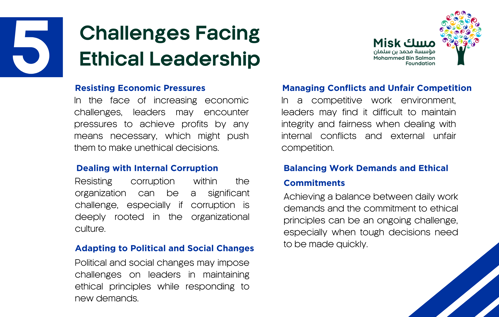
Ethical leadership is one of the most important topics that attract the attention of modern organizations, as it forms the core ethical values and principles upon which leaders build their success and positive influence. In today's business world, there is growing awareness of the importance of leadership based on integrity, transparency and fairness, not only to achieve profitability goals, but also to promote trust and responsibility within teams and institutions.
Ethical leadership is not merely an administrative approach, but rather a deep commitment to principles that promote a positive work climate and environment that contributes to sustainability and long-term growth. From this perspective, we will review the concept of ethical leadership and the core values on which it is based, and its significant impact in building trust and responsibility among groups and individuals. We will also discuss the challenges that ethical leaders may face and ways to overcome them to achieve success and sustainability.
Definition of Ethical Leadership
Evanino, Hartman and Brown explained that ethical leadership from an administrative perspective is a leadership style that focuses on commitment to values and ethical principles in all decisions and actions. Ethical leaders are characterized by integrity, justice, transparency, and dedication to serving the community and team. This style differs from other leadership approaches that may focus on profitability or power without considering human and ethical values.
In modern work environments, ethical leadership is essential for building healthy and positive atmospheres among employees and staff. Leaders who follow strong ethical principles help promote trust between team members, leading to increased loyalty and productivity. Ethical leadership also helps avoid scandals and corruption and contributes to enhancing the brand or organization's reputation in general.
Core Values and Principles of Ethical Leadership
Integrity and Transparency
Integrity means commitment to honesty and trustworthiness in all actions and decisions. The person of integrity leads transparently and shares information with the team clearly and truthfully. This helps build trust between the leader and employees, as everyone feels part of the team with the necessary information to make sound decisions.
Fairness and Justice
Fairness means treating everyone equally without discrimination or bias. Ethical leaders strive for justice in task and reward distribution as well as disciplinary decision-making. This behavior reinforces employees' sense of belongingness and appreciation and encourages teamwork and collaboration among team members.
Building Trust within the Team
An ethical leader builds trust through daily actions and behaviors. When employees see their leader acting with high ethics and following through on commitments, they feel trust in the leadership and are more willing to commit to shared goals and objectives. This shows that trust is the foundation for strong relationships and effective collaboration within a team.
Social Responsibility and its Relation to Leaders
Leaders typically prioritize social responsibility, especially regarding ethical leadership. Ethical leaders balance economic goals and achievements with serving society and demonstrating a human aspect for community growth and prosperity. They can do this by supporting community initiatives, encouraging employee participation in volunteer work, and committing to environmental and sustainability standards. This type of leadership boosts an organization's reputation and increases individuals' trust in and cooperation with the leader.
Therefore, many leaders care about social responsibility and make it an important part of their overall communications strategy with the public. There are four reasons why including social responsibility is an important step in ethical leadership:
Building Strong Community Relationships
Social responsibility helps build positive relationships with the local community and stakeholders through participation in community initiatives and support for social issues. An organization or state can build sustainable relationships with various community players in this way.
Promoting International Cooperation
Organizations demonstrating commitment to social responsibility often enjoy a good reputation internationally because of their commitment to delivering true value to communities and promoting cooperation with other countries or organizations to disseminate benefits worldwide.
Encouraging Sustainable Development
Participation in social responsibility supports sustainable development by adopting practices that reduce negative environmental impact and promote optimal resource use. This aims to tangibly impact individuals' and communities' health, helping preserve natural resources and achieve environmental balance for future generations to benefit from.
The Five Challenges in Practicing Ethical Leadership

How Do Leaders Overcome These Challenges?
Promoting an ethical culture within the organization greatly helps overcome this type of challenge, where leaders promote a culture of honesty and integrity within the organization. This can be achieved through training employees on ethical values, establishing clear policies that encourage integrity and transparency, and providing rewards for positive behaviors.
Commitment to transparency is considered one of the most important strategies used by leaders to overcome corruption and administrative problems that can lead to organizational failure. Open decision-making and communication with all team members helps build trust and address external pressures with integrity.
Dealing firmly with corruption or unethical tendencies through commitment to anti-corruption and establishing strict procedures applied effectively to all without exception is important. Leaders must lead by example in ethical conduct and have zero tolerance for any corrupt or overlooked practices.
By following these strategies, leaders can overcome the challenges facing ethical leadership and achieve sustainability in their work, leading to continued successes and cumulative growth reflecting their efforts to achieve fairness and equality among team members. This is because of their belief that successes can only be achieved through everyone's cooperation and working toward clearly defined goals.